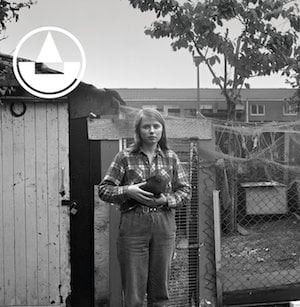Hauntology – a term coined by Jacques Derrida in 1993 – has been moving inexorably from the critical to the cultural sphere. Musically, it has become a stand-alone genre, a pigeonhole for a certain kind of sound: tracks that hark back to forgotten film scores or library music, peppered with esoteric and often occult references. It can be used to describe anything from Delia Derbyshire to Jennifer Gentle. Importantly, there are distinct strands which could be loosely described as ‘urban’ and ‘rural’. The former strand is what theorist Mark Fisher was referring to in his excellent book on the subject, Lost Futures. For Fisher, the hauntology of acts like Burial is a manifestation in music of a kind of bleak nostalgia for a future that never happened. It’s settings are urban wastelands, sink estates, disused underground lines – the kind of places that were once utopian visions but, post-Thatcher, are ostensibly examples of decay, both moral and physical. Then there is the rural strand, exemplified by acts as diverse as Boards of Canada, Belbury Poly and the so-called ‘Italian cult psychedelia’ movement. Rather than chronicling the death of the utopian dream, these acts attempt to recreate its most potent and hopeful moments.
But precious little has been heard from the middle ground – from leafy suburban hinterlands or culturally quiet small towns. This is where former Verve multi-instrumentalist and his band The Magnetic North come in. Tong was brought up in the Lancashire town of Skelmersdale. Skem (as the locals called it when I lived in those parts) was a designated New Town, and as such was part of the vaguely utopian social policies of post-war Britain. But like many similar towns, particularly in the north of England, Skem experienced a massive downturn in fortunes, caused partly by harsh treatment at the hands of Thatcher’s early government. So far, so gloomily hauntological. But in 1981 Europe’s largest centre for transcendental meditation was founded in Skem’s Ideal Village, and with it came an influx of positivity, revitalising the town and aptly mirroring its early vision.
Tong’s family was part of that influx and while Tong himself scorned the meditative practices of the movement in his youth, he has since come to embrace them. Prospects of Skelmersdale, his new album with fellow band members Erland Cooper and Hannah Peel, is Tong’s attempt to chronicle the feeling of a particular place, the kind of place that often gets overlooked in art and popular culture. Opening track Jai Guru Dev starts with a raga-like drone and chanted group vocals before a sampled female voice with perfect BBC diction invites us to ‘hold hands around the outer perimeter of the Golden Dome site’ in order to bless the opening of the centre at the Ideal Village. A blessing like this, as well as being a simple prologue, is a kind of affirmation giving the musicians symbolic freedom to further tackle their subject. Pennylands does so with urgent acoustic guitar and more overlayed group vocals as well a string section – chamber pop meets the BBC Radiophonic Workshop.
Death In The Woods feels like one of the record’s defining moments, describing the quotidian in exalted terms – a combination of banality and spirituality, synthy blips and earthy vocals. Sandy Lane once again makes use of sampled speech, acoustic guitar and gently ornamental strings. The result is something like a cross between John Cameron’s Kes soundtrack and the orchestral (or-kestral?) pop of the Divine Comedy.
Signs combines history lesson (a telling reference to Thomas More’s Utopia) with a melancholy personal narrative, Cooper’s voice swelling in and slipping out of the mix to great effect, while Little Jerusalem is maybe Peel’s standout vocal performance, another tale of small-town ennui and loneliness set before a musical backdrop that threatens to swoon into Cocteau Twins territory, but restrains itself throughout.
Remains Of Elmer is striking for its manipulation of found sounds and its repeated, descending electric guitar part, while Cergy-Pontoise‘s (it’s Skelmersdale’s twin town, if you’re wondering) percussion could almost have been glam in another life. Exit begins with sweet, simple piano – almost Satie-esque – before sampling a generic Sat Nav, which brilliantly becomes a metaphor for separation in this beautifully aching song. Then there is a well chosen, piano-led cover of Run Of The Mill, originally by everyone’s favourite musical transcendentalist, George Harrison, sung here beautifully by Peel.
In all probability Prospect Of Skelmersdale won’t find a home under the hauntology banner – it doesn’t sit comfortably with the rustic occultism at one end of the spectrum or with the techy, depressed minimalism at the other end. But despite that, it creates a sound – temporally disjointed, difficult to pin down – that appeals to the part of our subconscious mind that ‘remembers’ possible but unrealised futures, and does so in a way that is both hopeful and melancholy. It is a rare album that manages to be socially aware without being preachy, sonically vibrant without being derivative, but this one ticks all the right boxes. A superbly refreshing listen.
Review by: Thomas Blake
Released March 18th via Full Time Hobby.
Pre-order via Amazon

